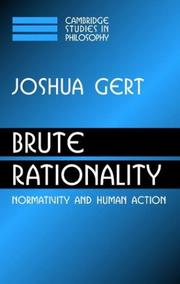| Listing 1 - 2 of 2 |
Sort by
|

ISBN: 0521833183 051121121X 9780511211218 9780521833189 0511216580 9780511216589 0511212984 9780511212987 0511214790 9780511214790 9780511487088 0511487088 9780521039536 0521039533 1107149134 1280516127 0511315368 Year: 2004 Volume: *26 Publisher: Cambridge ; New York : Cambridge,
Abstract | Keywords | Export | Availability | Bookmark
 Loading...
Loading...Choose an application
- Reference Manager
- EndNote
- RefWorks (Direct export to RefWorks)
This book presents an account of normative practical reasons and the way in which they contribute to the rationality of action. Rather than simply 'counting in favour of' actions, normative reasons play two logically distinct roles: requiring action and justifying action. The distinction between these two roles explains why some reasons do not seem relevant to the rational status of an action unless the agent cares about them, while other reasons retain all their force regardless of the agent's attitude. It also explains why the class of rationally permissible action is wide enough to contain not only all morally required action, but also much selfish and immoral action. The book will appeal to a range of readers interested in practical reason in particular, and moral theory more generally.
Morale -- Norme --- Morale normative --- Normativiteit (Ethiek) --- Normativity (Ethics) --- Normativité (Ethique) --- Normativité morale --- Normativité éthique --- Norme (Morale) --- Norme morale --- Norme éthique --- Normes (Morale) --- Normes morales --- Normes éthiques --- Règle (Morale) --- Règle morale --- Règles (Morale) --- Règles morales --- Éthique normative --- Decision making --- Moral and ethical aspects --- Moral and ethical aspects. --- Normativity (Ethics). --- Ethical norms --- Normativeness (Ethics) --- Ethics --- Decision-making (Ethics) --- Arts and Humanities --- Philosophy --- Decision making - Moral and ethical aspects
Book
ISBN: 1283601966 9786613914415 0191631868 9780191631863 019174221X 9780191742217 9780199657544 0199657548 9781283601962 Year: 2012 Publisher: Oxford Oxford University Press
Abstract | Keywords | Export | Availability | Bookmark
 Loading...
Loading...Choose an application
- Reference Manager
- EndNote
- RefWorks (Direct export to RefWorks)
Gert offers an account of normative facts and properties, those which have implications for how we ought to behave. He argues that our ability to think and talk about normative notions such as reasons and benefits is dependent on how we respond to the world around us, including how we respond to the actions of other people.
| Listing 1 - 2 of 2 |
Sort by
|

 Search
Search Feedback
Feedback About UniCat
About UniCat  Help
Help News
News